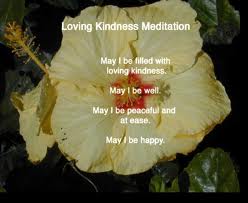This is the ‘prayer’ I’m offering each day over my dozen names, during Lent. It’s the first Buddhist prayer I learned, and remains my favourite. Whenever I’m very stressed, this is what I repeat. It isn’t a prayer in the sense that it’s directed at an outside force; it’s more ‘s a mantra, which is what I believe most prayers are ~ a way to invoke the sacred.
This was also my first ‘practice.’ I began w/ trying to love myself — so very difficult! But really? What’s the Golden Rule worth if you don’t love yourself and treat yourself well? If I was as hard on my bff as I am on my self, I suspect she’d dump me!
Later, as I felt more confident of my focus, I applied this meditation to those I love. Ultimately, I should be able to say it even for those I dislike intensely (unfortunately there are still plenty of those! :() I’m not really there yet.
 For those, I have tonglen. It’s closer to the idea of prayer for someone than even reciting the lovingkindness meditation. And it’s the only way I know to counteract my tendency to flaming anger. In tonglen, you take in someone’s pain, and try to breathe through it for them. When my mother-in-law is frightened at night, and doesn’t know where she is, I remember my own nightmares. I take the memory of terror, try to feel her terror as comparable, and then breathe it in. Breathing out? I try to send her comfort, peace, love. So it goes like this: breathe in pain/ breathe out light or comfort. Or love.
For those, I have tonglen. It’s closer to the idea of prayer for someone than even reciting the lovingkindness meditation. And it’s the only way I know to counteract my tendency to flaming anger. In tonglen, you take in someone’s pain, and try to breathe through it for them. When my mother-in-law is frightened at night, and doesn’t know where she is, I remember my own nightmares. I take the memory of terror, try to feel her terror as comparable, and then breathe it in. Breathing out? I try to send her comfort, peace, love. So it goes like this: breathe in pain/ breathe out light or comfort. Or love.
Pretty simple, but also profound. Because when my own grief is too much for me — as it has been sometimes lately — I think of the people I love facing so much worse. And tonglen lets me offer up my own grief, my own loss, hoping to lighten their burdens. I love the balance of it: there’s never ‘no point.’ I can take the hardest experience, the worst of griefs, and hopefully, at some point, use them. For someone else. Not just wallow :). 
I don’t always remember, of course. And sometimes I’m so self-absorbed I just flat can’t focus. But more and more, the more I practice (I guess that’s why they call it practice, huh?), the more often I can offer up pain — even physical — or grief or anger. I can, if I stop and breathe, turn it into light. For someone, if not for me. And somehow, that lightens it for me as well ~


